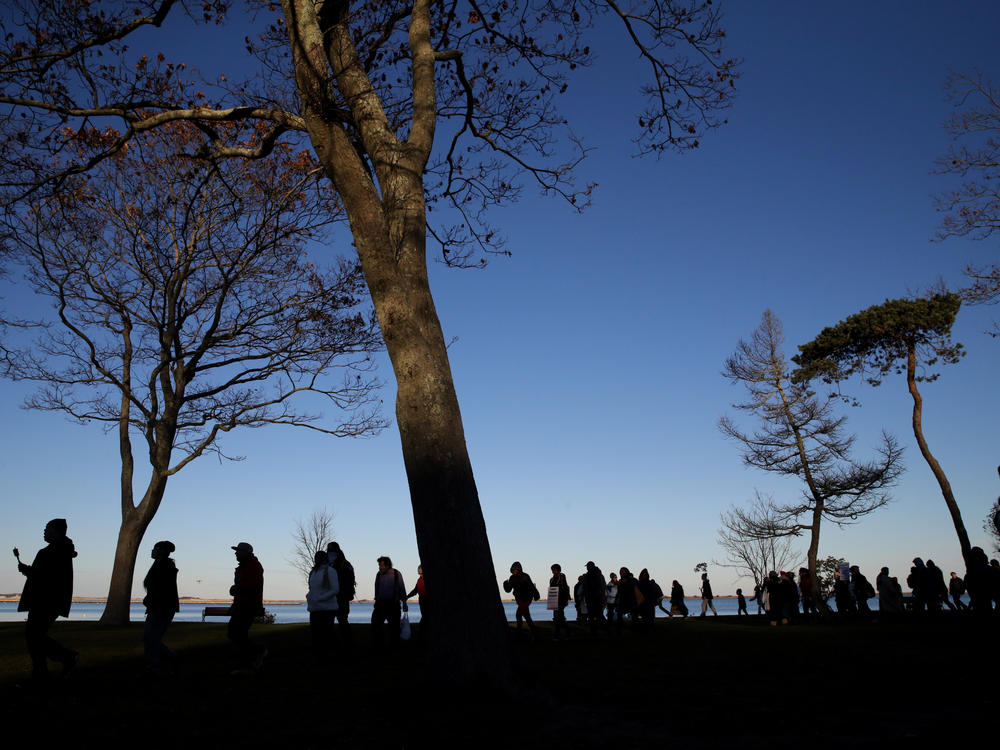Section Branding
Header Content
Educators And Native Leaders Recommend Bringing Anti-Racism To The Thanksgiving Table
Primary Content
For Walter Fleming, an enrolled member of the Kickapoo tribe in Kansas, Thanksgiving will be difficult this year because so many Native Americans have died from COVID-19.
"Particularly because it's been among our elders, the grieving is gonna be that much more," Fleming said. "These are the cultural guardians."
Fleming is a professor of Native American studies at Montana State University, who observes the holiday. He says it's a chance for people to come together, feast and celebrate.
"It's not because they've been colonized or because they might support any myths around Thanksgiving," Fleming said. "It is that we've grown up with the custom of celebrating Thanksgiving. It's just been a feast day."
Some Native Americans celebrate Thanksgiving by taking the opportunity to gather with loved ones and focus on gratitude. Others consider it a day for mourning because it perpetuates the myth that Pilgrims had a symbiotic relationship with Indigenous people and glosses over past atrocities committed against Native Americans.
"The myths behind the Thanksgiving holiday have been a factor in erasing Indigenous realities for decades, especially the myth that the Pilgrim and other European invasions were peaceful or friendly," said Mahtowin Munro, who is Lakota, and co-leader of the United American Indians of New England.
This year Thanksgiving comes as chronically under-resourced Native populations are contracting COVID-19 at record rates. In August, the Centers for Disease Control and Prevention reported that Native Americans are 3.5 times more likely to get COVID-19 than white people.
According to the CDC, more than 53,000 Native Americans and Alaska Natives have contracted the virus and nearly 1,300 have died — a number that is likely an underestimate because many jurisdictions don't compile data on ethnicity.
Thanksgiving also comes on the heels of widespread protests demanding racial justice. Native Americans have their own history with police brutality, and are incarcerated and killed by police at disproportionately high rates. SomeIndigenous and Black advocacy groups have partnered together in the push for racial justice.
Following the record-breaking election of six Native Americans to Congress, some advocates are hopeful the nation's latest reckoning with race will lead to change.
"I think there is a strong and empowered desire, and not just from Indigenous peoples, but from a broader body politic," said Shannon O'Loughlin, who is Choctaw, and executive director of the Association on American Indian Affairs.
But, Native leaders say, more needs to be done.
"I don't think there can be any reconciliation until conditions actually change for Native people," Munro said. "This is not just about history and Thanksgiving; this is about what is happening right now in 2020."
While the injustices are clear, O'Loughlin says, addressing them is hard at a time when people are polarized.
"I think people want to resolve the burdens of our history. I think what's been painful is that people don't know how to do it," O'Loughlin said, adding that taking the day as a chance to combat racism is a step forward.
"Even if it's only one day," said O'Loughlin, "it's an opportunity for us to re-learn."
Here are some ways educators and Native leaders recommend bringing anti-racism to the table this year:
- Watch the National Day of Mourning on Nov. 26 and learn about it. Munro recommends learning about the National Day of Mourning, an annual event held in Plymouth, Mass., to protest and mourn the destruction of Indigenous people by white colonizers. Hosted by the United American Indians of New England, this year it will be livestreamed on Thanksgiving.
- Learn about Native American culture and history — and not just this month. Indigenous organizations report a flood of attention every November during American Indian and Alaska Native Heritage Month, and then a drop off. "It's frustrating every year Native organizations and people like me are asked the same questions," O'Loughlin said. "And we go out to all different sorts of groups to educate them about Indian Country and Native America, and every year we have the same questions asked of us."
- Know that Native Americans are not a monolith. Be specific when talking about someone's tribe. Native Americans — a term that encompasses 574 federally recognized tribes — have different histories, beliefs and cultural practices. "We are not all the same," said Mahtowin Munro, co-leader of the United American Indians of New England.
- Honor the original inhabitants of the land you're on. Colonizers seized land from Native tribes, and land repatriation is at the core of some Native activism efforts. "If we're looking to celebrate Thanksgiving in an anti-racist way, we have to acknowledge and be grateful for the people on whose land we stand," said O'Loughlin. She recommends checking out the Native Land Digital website, where you can search for first inhabitants by entering your address.
- Support Native American organizations, causes and efforts. "Do something good in Indian Country," said O'Loughlin, "whether it's donating to a native nonprofit whose doing work that you believe in, or thinking about what used to be here before you and recognizing those people had the same desires and dreams."
- Know that confronting racism is hard. "Give yourself grace," said Olga Pagan, an educator at the Center for Racial Justice in Education. She recommends setting realistic goals, and approaching people gently — a strategy she is using this year. "I'm not gonna talk with people about genocide; I'm gonna read two books and say a note about the land that we're on," said Pagan. "And if people want to talk more, cool, but if they don't, I'm gonna move on and the seeds have been planted."
Piper McDaniel is an intern on NPR's National Desk.
Copyright 2020 NPR. To see more, visit https://www.npr.org.

